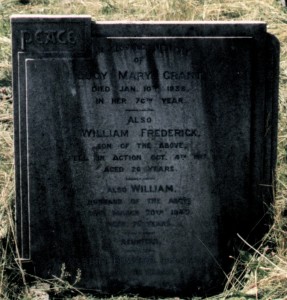Albert Walter Grant
Pioneer 231037 Carrier Pigeon Service
Royal Engineers
Division 76
Extension
Albert Walter Grant was the son of Lewis William and Beatrice Grant and husband of Bertha Florence Grant. His grave is a registered war grave but the headstone is a family memorial. His story is one which is particularly tragic but in its day not uncommon. The headstone reveals that both his daughter and wife lie with him in the same grave. He had served two years in France returning after demobilisation on the 17th February 1919. He was immediately struck down with influenza which developed into pneumonia. He passed the influenza on to his 2½ year old daughter, Phyllis Mary. Neither father or daughter survived. Albert died on the 28th February 1919 and Phyllis on the 5th March 1919. The Reading Standard of 8th March 1919 carried an account of the funeral.
“The deceased who was only 31 years of age, joined up in Jan 1917 and went to France a month later in the RE Pigeon Service Section. After serving just over two years he returned from France on February 17th last and took to his bed, from which he never again rose. Unfortunately his little daughter was stricken with the dread disease, with fatal results, and both were buried together. Before joining up Mr. Grant was a well known figure in Reading, having been connected with dairy business from his youth. His one hobby was pigeon racing, and to this he devoted much of his spare time. He was a member of local pigeon clubs and had won several prizes for the excellence and swiftness of flight of his birds.”
Bertha Grant survived her husband and child, living until her 80th Year, she died in 1961.
Albert Walter Grant, known as Bert was brought up at Battle Farm. Tragedy struck the family again later in the year 1919 when his brothers wife died aged 33. Both family graves lie near each other in Division 76. The grave number of Albert’s grave is 16591.
The 1911 census shows that Albert’s mother was the head of the family and she and her four sons and one daughter were running their dairy farm at Battle Farm, Oxford Road, Reading. This had been the family farm in 1901 when Lewis Grant was also alive.
